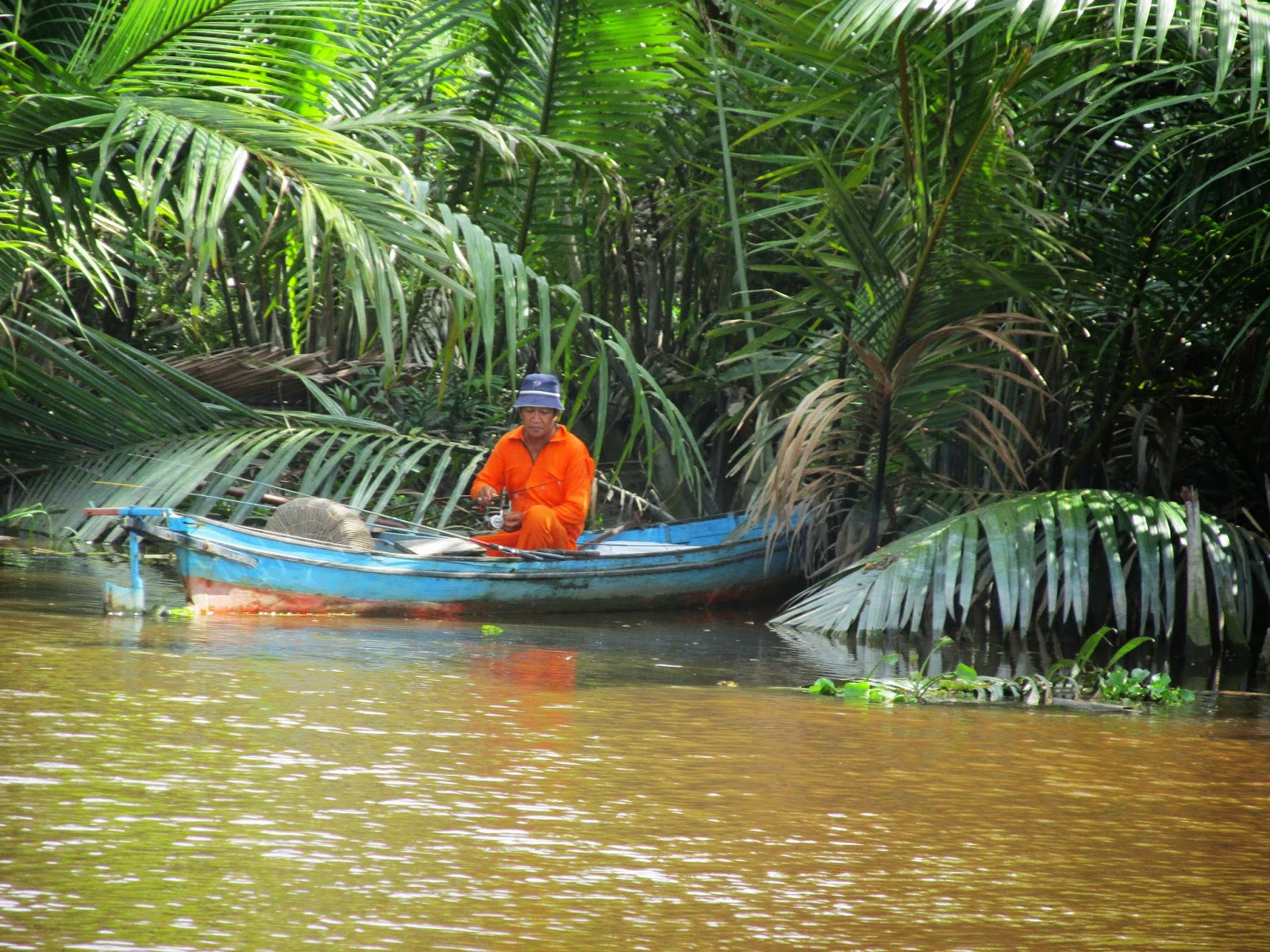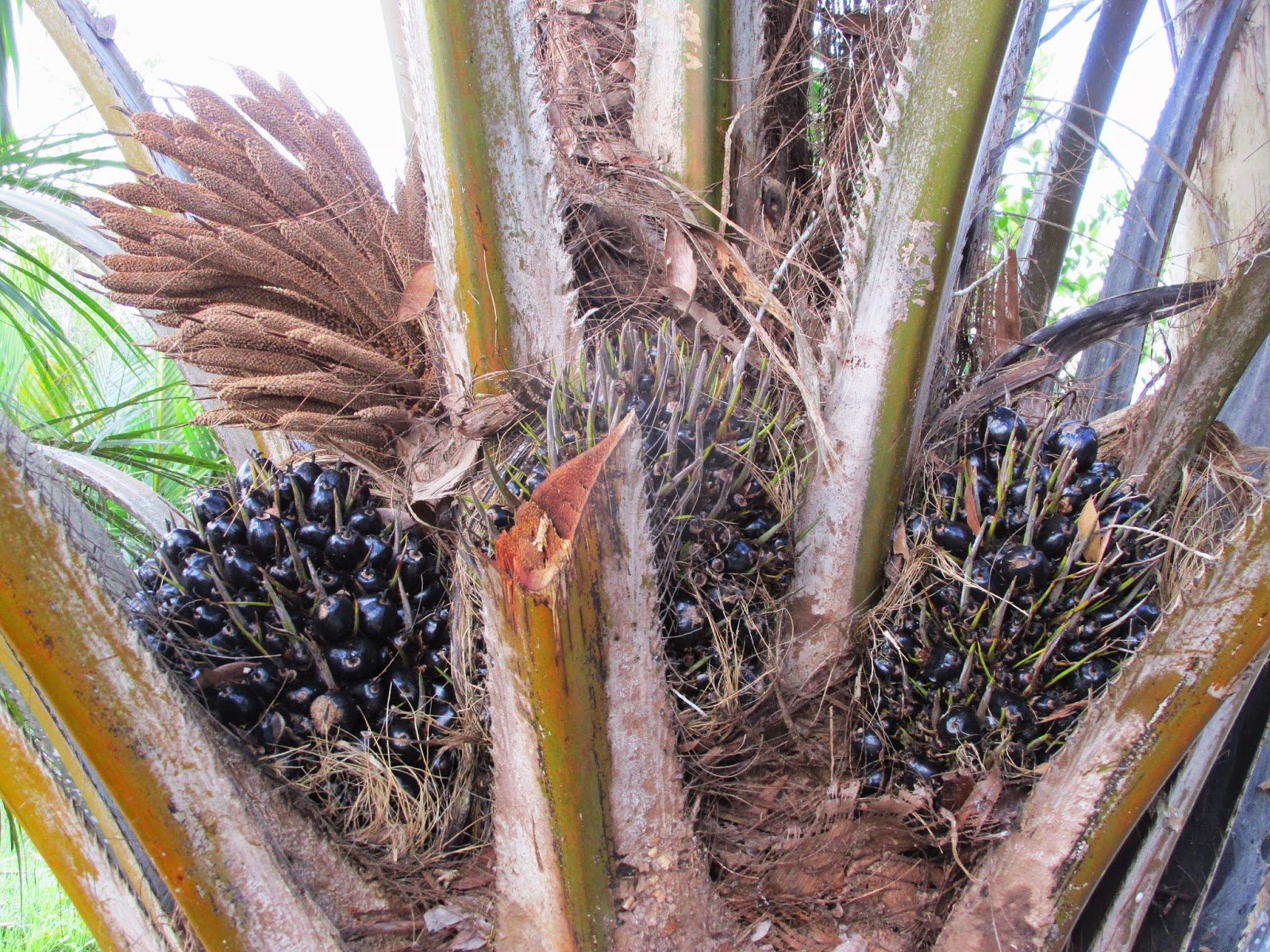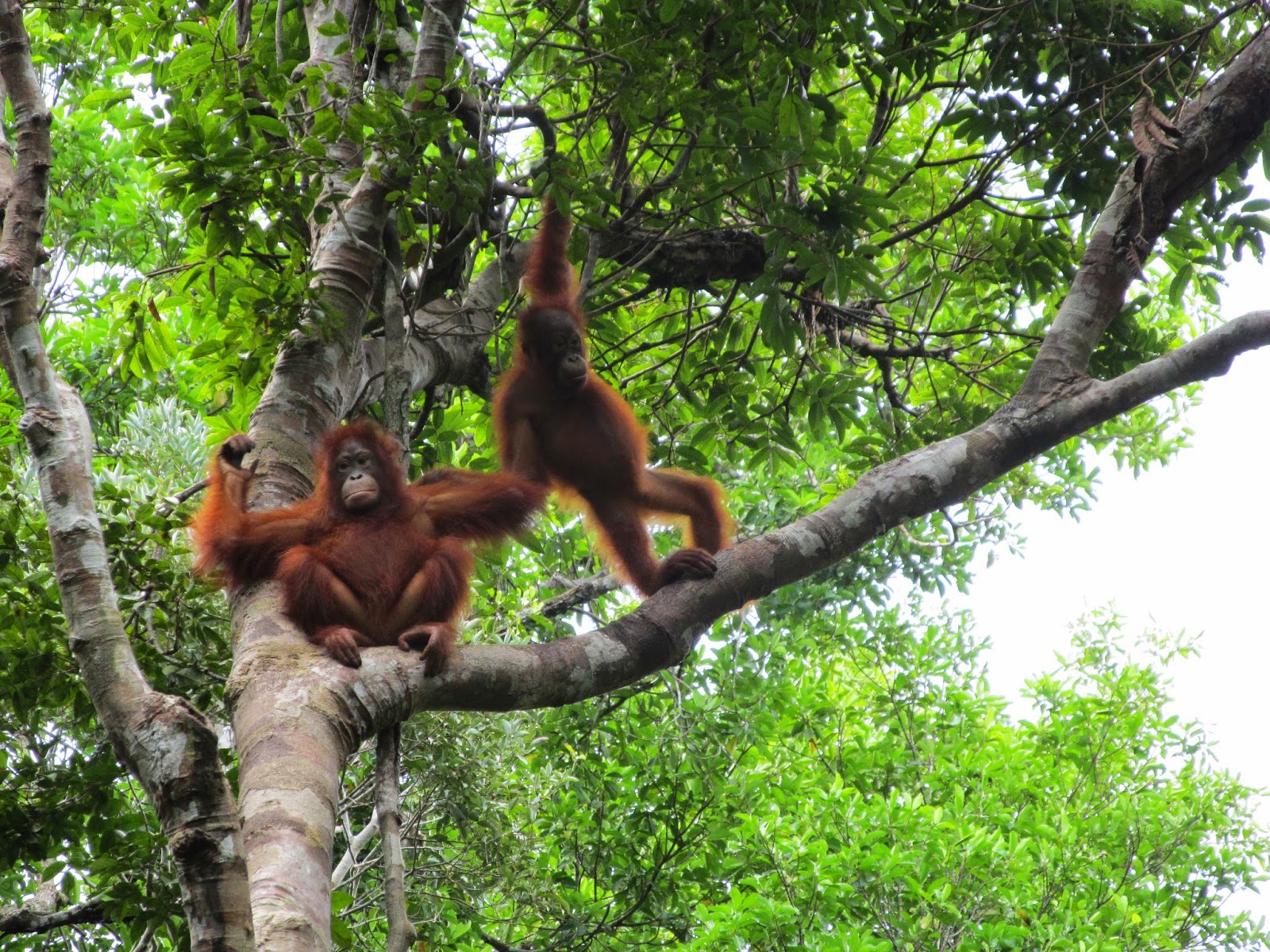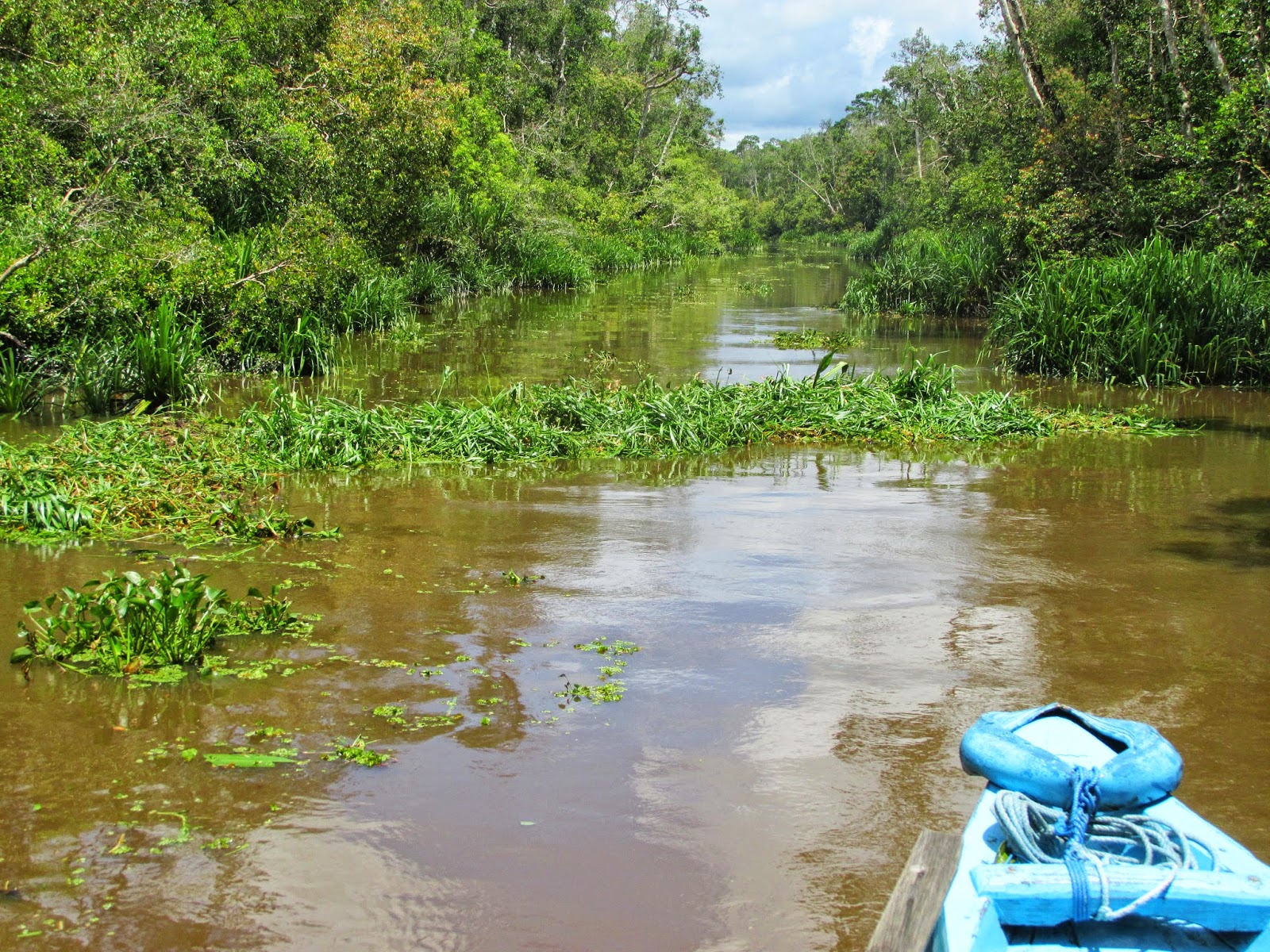Saturday
morning I flew to Pangkalan Bun on Borneo island where I began my four-day
river boat trip to see the orangutans. The time of my flight had been changed
to be two hours later, and then the flight was changed and to depart another
two hours later. The flight was listed as “scheduled.” Then it was changed to
“estimated,” which made me a little concerned because another flight that had
had that change was then changed to “delayed.” So when it changed to “waiting
area,” I was very happy. In the end I arrived on Borneo four hours later than
originally planned. This meant that there wasn’t time to get to a feeding
station that afternoon. So one less orangutan viewing opportunity, but I was
just glad to have arrived and to be there.
I was
met at the airport and taken to the boat where I met Dewa, my guide, and the
three crew members—captain, assistant, and cook. Usually these trips have a
minimum of two people; so I was very lucky that the agent had agreed to take me
alone. The boat was smaller than the pictured boat, but I didn’t care. I was
just happy to be on the trip and not to have to pay for two people, which I had
decided I would do.
The
wooden boats are called klotoks after the sound the engine makes.
The upper level
has a mattress that became my bed at night.
The front end has two chairs in
which I could relax and watch the river go by. The lower level is where the
crew stayed. It has a small kitchen where meals are prepared. And the captain
has a small room where he steers the boat. The toilet/shower is at the back.
It’s an open shower, meaning it doesn’t have a roof. This was fun when it was
raining. There is a barrel of river water that is used for flushing. When I
wanted to take a shower, they turned on the generator that brought river water
to the shower. The boat has electricity, but if I wanted to recharge
electronics, they turned on another generator for that purpose.
After
waiting half an hour because the park ticket office was closed for lunch, we
finally embarked on this adventure to Tanjung Puting National Park. On the big
river, there were several barges. Dewa said these take supplies, such as
gasoline and fertilizer, to the island and take palm oil out. This is a salt
water river.
Lunch
was served shortly after we started the journey, since it was already 2:00 and
the others had eaten. All the food was delicious, which resulted in my eating
too much. This introduction to meals on the boat was huge prawns, fried tofu,
veggies, and watermelon. I dug into the veggies and ate them quickly, since I
hadn’t had any for a while, which made them extra delicious.
We soon
left the main river, turning into a branch that is mixed salt and fresh water.
Later it becomes fresh water. After a while we stopped at a Dayak village to
purchase supplies. Dewa suggested that we had time to walk in the village if I
wanted to. Of course I did. About a hundred families live in the village. They
fish or work at the national park.
They collect rain water in large barrels for
washing. Otherwise river water is used.
Clothes are washed in the river. They
use solar electricity, as there are no power lines.
Most houses are basic wood,
but some are a bit fancier and are painted bright colors. I noticed that some
of the women had powder on their faces. Dewa said they believe it keeps them
cool, which reminded me that Thais also use cooling powder. The elementary
school is in the village. Students go by motorcycle to another village for
middle and high school. There is one narrow path that is paved for motorcycles.
In the
village we saw several palm oil palm trees. The woman who picked me up had told
me that these are one of the causes of orangutan endangerment. People clear the
jungle to make more room for palm oil trees, as they are a cash crop, thus
destroying the orangutans’ homes. Also, the orangutans eat the fruit, which
causes plantation owners to kill them. Park rangers are training the farmers to
call the police when they see an orangutan so it can be safely removed.
When we
returned to the boat, I was given a plate of fried bananas as a snack. This
happened every afternoon. We passed two groups of proboscis monkeys in the tree
tops. Dewa explained that they are sometimes called Dutch monkeys because some
Dutch men have a big nose. I understood this better when I looked at photos
taken with the telephoto lens.
At
5:45, it started to rain, and it continued raining heavily for about twelve
hours. The men put down canvas window covers to protect the area from the
water.
Then they got my sleeping area ready by putting a sheet on the mattress,
putting down the mosquito net around the bed, and putting down mosquito nets to
enclose the whole area. Quite a cozy little room.
The
main course for dinner was fish. The fish are from fish farms, not from the
river. I enjoyed seeing local men fishing on the sides of the river, but their
fish are not for our consumption.
There
were three other boats docked with ours for the night. Since this was the quiet
season, I asked how many would be there during the tourist season. About
twenty.
Breakfast
Saturday morning included an omelet with cucumber, something I wouldn’t have
thought to do. At 8:00 Dewa and I started the 45-minute walk to the feeding
station, which I later learned is Camp 2. (I thought it was the first camp, not
realizing that we had missed Camp 1 on Friday.)
On the way we saw a few
varieties of pitcher plants, which are carnivorous. Insects are attracted to
the water inside the pitcher, but they can’t get out because the sides are very
smooth. Thus they become food for the plants.
We went through an area where
there are no trees. Dewa explained that this had been a Dutch farming area in
the 1940s; so all the trees were cut down. They are getting ready to replant
trees.
About
2000 orangutans live in this area, and 6000 to 7000 live in the whole park, all
three camps. When we arrived at the feeding station, the ranger called to
attract the orangutans. However, none came for about an hour. Then we saw two
young ones playing in the trees. Dewa said they were being shy because their
mother wasn’t there.
The ranger enticed them to the platform by holding out
fruit and then moving until they arrived at the platform. They grabbed the
fruit and quickly escaped to the trees.
Then a female came and sat on the
platform. After a bit, I realized that she had a baby under her arm. Using the
telephoto enabled me to see the baby much better. She stayed eating for about
fifteen minutes.
When she was there, the young ones stayed for a while, too. Since this is the rainy season, there are lots of fruits in
the forest; so the orangutans have adequate food and don’t need to go to the
feeding stations. During the dry season, many more eat there.
I
learned at an information center that orangutans have their first baby when
they are 14 years old. The baby stays with its mother until it is about six
years old. The mother has a baby every eight years, having five or six total.
There
were about a dozen people observing the orangutans. I met several of them at
all of the stations I visited, as we were on the same basic tour. Others seemed
to be going the other direction, as they talked about their experiences at
other feeding stations.
When
the walk back to the boat was much shorter than the walk to the feeding
station, I learned that we had taken the “scenic route.” This was a pattern
that was repeated on each trip to a feeding station. A good opportunity to
explore and experience the jungle.
At
10:45, the boat took off down the river for two hours. The river was full of
plant debris from the rainstorm during the night. At one point a pipe became
clogged, and the mechanic/assistant had to clear it before we could continue.
As we turned onto the branch we would be following next, Dewa pointed out that
the water color was different. In the larger river the water is brown because
of illegal gold mining. They throw the mud into the river. It is hard to stop
the illegal mining because the miners stop when the authorities come and then
start again. Also because of bribery. I loved the reflections of trees and
clouds in the clearer water.
In the
afternoon, we went to Camp Leaky, which is Camp 3. The camp was established by
Birute Galdikasand and her husband in 1971 under the mentorship of Louis Leaky,
who also sponsored Jane Goodall and Dian Fossey. Although the other two women
are quite famous, I’d never heard of Galdikasand before. She now lives mostly
in the U.S. but visits the camp sometimes, making this site the longest
continuous study of a wild, non-human animal by primarily one person, as the
sign states. There is a cabin she stays in when she is on site. She has written
a few books that I am now interested in reading.
When we
arrived at the feeding station after our 45-minute walk, a wild pig was also
arriving. It stayed under the platform most of the time we were there, cleaning
up fruit peelings dropped by the orangutans.
The
first primate we saw was a gibbon. It jumped from tree to tree very rapidly. It
also very quickly went to the platform, grabbed fruit, and quickly returned to
a tree.
A
mother orangutan and her child walked in. When she sat, I noticed that she had
a baby under her arm. They ate a little but didn’t stay long.
 Then they
returned and the father came through the trees. It was awesome watching him
swing from tree to tree. They ate for a long time; so we had a good opportunity
to watch them.
Then they
returned and the father came through the trees. It was awesome watching him
swing from tree to tree. They ate for a long time; so we had a good opportunity
to watch them.
When the mother and child tried to leave, the wild pig chased
them; so they quickly returned to the safety of the platform. This happened a
couple times. Then the father left, and the wild pig followed him. The mother
and child then went the other direction.
When
they all left, we walked fifteen minutes back to the boat and then rode for
twenty minutes to our stopping place for the night. Dewa told me that the water
for showering would be clear because the river water was now clear. Ten minutes
after we returned at 4:00 the heavy rain started, a reminder that it was the
rainy season. After the men put down the canvasses and set up my sleeping
quarters, I decided to take a shower. Poor thinking on my part. Since the
shower is open air, there was no way to keep a towel dry. But the shower water
was fresh—that from the shower itself and the extra from the sky. In the
morning, Dewa told me that it only rained till about midnight.































No comments:
Post a Comment